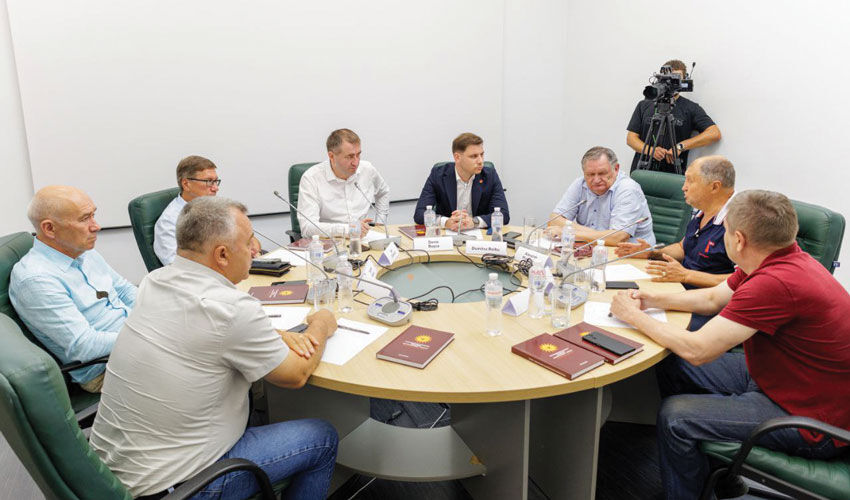
This vision was the result of many years of practical work by a group of economists, entrepreneurs and managers united by the goal of developing a development strategy based not on theory, but on real experience – in business, in production, in management. As a result, a fundamental work was created, which the Alianța MOLDOVENII party headed by economist Denis Roşca took as the basis of its program. And then it started a national public dialog on the formation of an action plan to lead the country out of the protracted crisis.
The public discussions have been taking place since August 1 and every other day gather leading experts and specialists in their fields around a round table. Each such meeting goes beyond theoretical approaches, as it accumulates practical initiatives. As a result, the party’s program acquires real applied value and opens up opportunities for building an effective economic policy at the national level. This is a unique experience of interaction between the party and society.
The round table held on August 5 was devoted to the issues of economic development, import substitution, export promotion and regional development. It brought together leaders of the business community, heads of large companies and holdings, who have decades of work both in the country and on the most distant continents. You do not meet such specialists very often, and it is a happy occasion to meet them together.
Some would say that these people have an unconventional, even daring vision. But, as practice has shown, it was “standard” approaches that brought the country to a dead end. That is why today we need fresh ideas based on real experience, common sense and a deep understanding of how the economy works.
Six pillars of development
Alianța MOLDOVENII’s position is based on the fact that in order to jump-start the economy, six pillars need to be worked on in parallel. These are.
Legislation: The system is over-regulated – 70% of regulations and permits are redundant, unnecessary and should be eliminated. To start the flywheel of economic growth, the state only needs to provide a convenient legislative framework.
Infrastructure: There are millions of square meters of unfinished and empty buildings in the country, but business has no access to them. Such areas should be leased out for production free of charge, and the state would receive revenue from taxes on salaries, profits and other levies.
Raw materials: Moldova has 33 categories of undeveloped raw materials. We export one million tons of wheat – raw material for starch, ethanol, confectionery and livestock production. Thus we “kill” in the value chain the enterprises that could create tens of thousands of jobs. And this is just one example. In general, we have our own raw materials for the production of almost 73% of products that are now imported!
Finance: Moldova is capable of generating the necessary financial resources on its own, without dependence on “handouts” from abroad.
People: It is possible to bring back the diaspora. Generations of specialists have grown up abroad in professions that are not even trained in Moldova. They should be given a wide range of benefits and motivated to do high-level work at home.
The second thing is the retraining of personnel. For example, in the USA, 1% of the population works in agriculture, in Great Britain – 0,61%, but the yield is much higher there. Explanation: they use technology there – retrained and focused on post-harvest processes rather than growing crops.
Third, it is important to increase employment. Now in Moldova only 42% of the population works, while the norm is 75%. The solution could be the transfer of workers from the public sector to the private sector with higher wages. And most importantly, to expand the country’s productive potential, we need managers who are ready to take responsibility for the development of the state.
Mediatization: This is an important aspect that many governments, especially in poor countries, underestimate. In Moldova, people are often simply unaware of opportunities because of poor coverage of technology, skills, financing and markets. This is what needs to be televised – to cultivate creation, not just consumption.
Real growth opportunities
Business evaluations have shown that even the most well-rounded program leaves room for improvement.
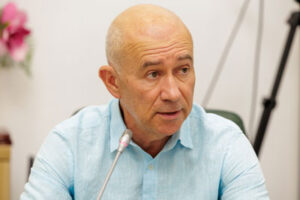
Nicolas Nikula, President of Covoare Ungheni SA, voiced important business requirements that are needed here and now – free competition and predictability.
“We have endless government regulations. Most of the economy and budget is kept by small businesses, which need to be developed. But only those who know how to “spin” can cope with the system. And it is very difficult for young guys. When they come with a tax audit, they have to “find something”. But why do they have to find something?! We need clear rules without double interpretations and a clear mechanism of work. For example, a flat tax of 2% of sales would simplify the system and costs.
Further – more: the talk was about the “blood of business” – financing: “Banks have excessive profits, and enterprises are closing down – this should be a signal to the authorities. Several large banks have virtually monopolized lending to ‘serious’ business. There is a list of appraisers approved by the bank, and if the appraiser is not suitable, they do not work with him. This forces them to adjust, because of which pledges are sometimes overvalued 10 times higher than the loan. Businesses are just getting their hands twisted.
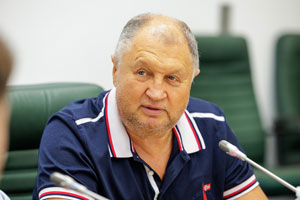
Iurie Mihalaki, president of the investment holding IMC Group, a businessman with experience in the most exotic markets and cooperation with the world’s leading banks, including the Islamic Development Bank, shared his harsh view of the Moldovan management system.
“All forms of governance and administration in Moldova have proved ineffective over the years. We can change judges, prosecutors, deputies, but nothing will change until the system itself changes! It is necessary to change the organizational structure of application and control of efficiency. Everything must be systematic. Simply put, it is impossible for someone to just decide without having the appropriate knowledge in agriculture, economics, marketing, management. No matter how good the plan is, it should be implemented by those who understand and know how, we need a workable administrative system”, – emphasized Yuri Mikhalaki.
And he suggested – this is truly a challenge – to abandon the Ministry of Economy and create the Ministry of Revenues instead! Although, why not? After all, as you name the ship….
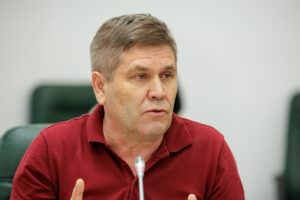
Anatol Rascu, a metalworker and owner of a tractor factory, suggested focusing on industry: “We went from being an agricultural country to a poor one, without ever becoming industrialized. But it is industry that will save us!”.
According to Rascu, the Ministry of Economy should be transformed into the Ministry of Industry (although he also endorsed the idea of creating a Ministry of Revenue) and a Ministry of Diaspora should be created.
Solutions for change for the better
As Igor Krapivka, CEO of Orvento Metal, summarizing the discussion, noted, although there is not yet complete unanimity in opinions, there is a “very high degree of identity”.
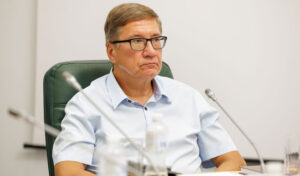
Everyone unequivocally agrees that the country needs a different quality of governance. The quality of life, the quality of ecology, service, and labor force depends on it.
The system of dual education, which trains both “headstrong” and “handy” specialists, is also important, Krapivka reminded about another problematic aspect. It is necessary to develop industrial platforms and robotic agriculture. For example, Moldova can supply a million tons of table grapes if it adopts modern technologies. And there is also clustering: uniting science, education and production, especially in the agro-industrial complex.
A separate issue is energy. “Today we are uncompetitive because of expensive and inefficient energy. It is necessary to find ways and partners to generate energy on our territory, and there is a willingness to initiate projects on small-scale nuclear power – this is the most affordable type of energy.”
In general, Moldova needs an efficient and affordable infrastructure for the economy, and the state should become a “cold start” for all this, a center that launches reforms and development. The main task is to find the thread that will unravel the tangle of problems. If we do not do it in 5-7 years, we will never do it.
The development strategy of the Republic of Moldova, taken as a basis for the political program of Alianța MOLDOVENII, will be further developed with sectoral decisions, in order to form a verified, realistic, holistic and, most importantly, applied document. With clear rules for business, real support for small enterprises and clear incentives for investments. But it is already obvious: Moldova for the first time gets a truly systematic approach to public administration and economic development. Perhaps this is what we lacked – the missing piece of the puzzle, without which the economy could not move forward. Now much is becoming clear: the elements are beginning to line up into a single working scheme, which is gaining partners, associates and supporters, a force capable of giving Moldova back the confidence to live, develop and prosper.
* Political advertisement of the political party Alianța MOLDOVENII, paid under contract no. 4/30 of 06.08.2025, invoice no. 180 of 07.08.2025

